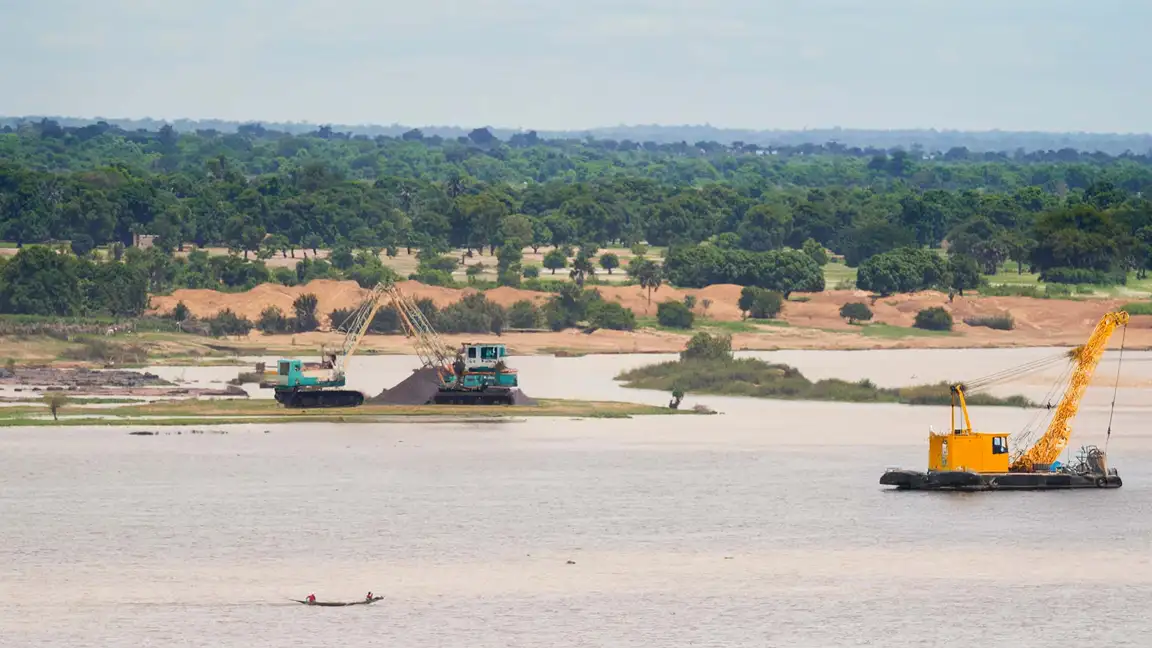Dr. Kuba’s Call for Action
The call for the dredging of the River Niger to unlock its vast economic potential has been strongly advocated by Dr. Richard Kuba, a distinguished German researcher and cultural anthropologist. Dr. Kuba, who has carried out extensive research in several countries, including Nigeria, Benin, Burkina Faso, France, and Australia, recently delivered the 13th Distinguished Public Lecture at the Federal University Lokoja in Kogi State. His speech, titled “The Middle Niger: A Historic Trade Hub and Cultural Crossroads,” underscored the pivotal role of the river in Nigeria’s historical and economic development, urging the government to invest in dredging efforts to help harness its full economic capacity.
In his lecture, Dr. Kuba highlighted the historical significance of River Niger as a major conduit for trade and cultural exchange. Once the heart of commerce and a connector for various civilizations along its course, the river has, in many ways, been underutilized in the modern era. According to Dr. Kuba, the river’s full potential has not been realized because its navigable parts have not been properly developed or dredged to allow for easier transport and trade.
Dr. Kuba emphasized that the federal government must take proactive steps to dredge the river, ensuring better access to its valuable economic benefits. By improving the river’s navigability, the government can support a wide range of economic activities, from trade and agriculture to tourism and transportation, which will, in turn, stimulate national economic growth.
River Niger: A Hidden Economic Asset
Historically, the River Niger was not just a geographical feature; it was a vital trade route that connected diverse communities and civilizations. In pre-colonial times, it enabled the movement of goods, ideas, and culture between different ethnic groups and regions. The river facilitated the development of trade networks that brought together people from West Africa, influencing the region’s cultural and economic landscape.
Dr. Kuba pointed out that today, while River Niger continues to hold immense promise, its capacity to support modern trade and commerce remains untapped. The river, which spans multiple regions, is a critical asset for Nigeria and Africa as a whole. If dredged, it could serve as an essential transport route for goods, particularly for areas that rely on river transportation. However, to truly tap into the river’s potential, the government must invest in dredging and infrastructure to make these parts of the river navigable for larger vessels.
Impact on Nigeria’s Economic Prosperity
Dr. Kuba believes that dredging River Niger could substantially improve Nigeria’s economic landscape. The river, if fully navigable, would open up new opportunities for local economies by facilitating the transport of goods such as agricultural products, minerals, and industrial supplies. Regions located along the river could benefit from enhanced trade, leading to job creation, increased productivity, and regional economic growth.
Additionally, the river’s strategic position makes it an ideal location for boosting the country’s tourism industry. By dredging the river, Nigeria could encourage eco-tourism and river cruises, attracting both local and international visitors to experience the rich cultural history tied to the river. Improved river infrastructure would also make it easier to access and transport goods, bolstering agricultural exports and improving access to domestic markets.
The overall benefit to Nigeria’s economy would be multifaceted: transportation costs would decrease, economic activities would increase, and trade would be revitalized, particularly in rural areas where the river’s access is crucial.
Educational and Collaborative Opportunities
In addition to his focus on the economic benefits of dredging the River Niger, Dr. Kuba also addressed the importance of educational exchange. During his lecture, he expressed interest in collaborating with Federal University Lokoja to establish academic exchanges for students studying archaeology and cultural studies. As an expert in African history, Dr. Kuba understands the value of international exposure for students and is eager to share his knowledge to help foster deeper research in the field.
He mentioned that the Frobenius Institute in Germany, where he is a researcher, is actively involved in archaeology and cultural studies. Dr. Kuba emphasized that such partnerships would help expose students at Federal University Lokoja to global perspectives in archaeology, enriching their understanding of both African and global historical contexts.
Historical and Cultural Relevance of Lokoja
Lokoja, where the Federal University is located, has long been at the heart of Nigeria’s commercial and cultural exchanges along the Middle Niger. As a historic trade hub, Lokoja has served as a confluence of different cultures, civilizations, and trading routes, which has helped shape the identity of the region.
Dr. Kuba pointed out that Lokoja’s role in pre-colonial times as a trade route for goods, from slaves to salt and gold, has left an indelible mark on the region’s history. This rich cultural heritage makes Lokoja an ideal subject for research in history, anthropology, and socioeconomic studies. Dr. Kuba emphasized that exploring Lokoja’s historical significance can help drive not only academic research but also policy-making and tourism initiatives aimed at celebrating the region’s diverse heritage.
Conclusion
Dr. Richard Kuba’s call for the dredging of River Niger is more than just a technical recommendation; it is a call to action for Nigeria to tap into its historical and economic assets. By dredging the river and improving its navigability, Nigeria stands to gain immensely in terms of trade, transportation, and regional development. The proposal to integrate educational exchanges between Nigerian institutions and global research bodies like the Frobenius Institute further strengthens the connection between economic growth and intellectual exchange.
As Nigeria continues its journey toward economic prosperity, embracing the potential of its natural resources—like River Niger—will be a vital step in securing a brighter future. With proper investment and attention, River Niger can once again be a cornerstone of Nigeria’s economic development and a symbol of the country’s rich historical legacy.
